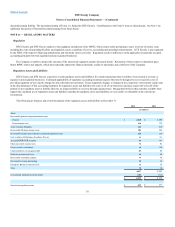DTE Energy 2012 Annual Report Download - page 70
Download and view the complete annual report
Please find page 70 of the 2012 DTE Energy annual report below. You can navigate through the pages in the report by either clicking on the pages listed below, or by using the keyword search tool below to find specific information within the annual report.
Table of Contents
Available-for-sale Securities
At December 31, 2012 and 2011, these securities are comprised primarily of money-market and equity securities. During the year ended December 31,
2012 and December 31, 2011 no amounts of unrealized losses on available for sale securities were reclassified out of other comprehensive income into net
income for the periods. Gains related to trading securities held at December 31, 2012, 2011, and 2010 were $9 million, $3 million and $7 million,
respectively.
The Company recognizes all derivatives at their fair value as Derivative Assets or Liabilities on the Consolidated Statements of Financial Position unless
they qualify for certain scope exceptions, including the normal purchases and normal sales exception. Further, derivatives that qualify and are designated for
hedge accounting are classified as either hedges of a forecasted transaction or the variability of cash flows to be received or paid related to a recognized asset or
liability (cash flow hedge), or as hedges of the fair value of a recognized asset or liability or of an unrecognized firm commitment (fair value hedge). For cash
flow hedges, the portion of the derivative gain or loss that is effective in offsetting the change in the value of the underlying exposure is deferred in Accumulated
other comprehensive income and later reclassified into earnings when the underlying transaction occurs. For fair value hedges, changes in fair values for the
derivative are recognized in earnings each period. Gains and losses from the ineffective portion of any hedge are recognized in earnings immediately. For
derivatives that do not qualify or are not designated for hedge accounting, changes in the fair value are recognized in earnings each period.
The Company’s primary market risk exposure is associated with commodity prices, credit, interest rates and foreign currency exchange. The Company
has risk management policies to monitor and manage market risks. The Company uses derivative instruments to manage some of the exposure. The Company
uses derivative instruments for trading purposes in its Energy Trading segment. Contracts classified as derivative instruments include power, gas, oil and
certain coal forwards, futures, options and swaps, and foreign currency exchange contracts. Items not classified as derivatives include natural gas inventory,
pipeline transportation contracts, renewable energy credits and storage assets.
Electric — DTE Electric generates, purchases, distributes and sells electricity. DTE Electric uses forward energy contracts to manage changes in the
price of electricity and fuel. Substantially all of these contracts meet the normal purchases and sales exemption and are therefore accounted for under the
accrual method. Other derivative contracts are recoverable through the PSCR mechanism when settled. This results in the deferral of unrealized gains and
losses as Regulatory assets or liabilities until realized.
Gas — DTE Gas purchases, stores, transports, distributes and sells natural gas and sells storage and transportation capacity. DTE Gas has fixed-
priced contracts for portions of its expected gas supply requirements through 2015. Substantially all of these contracts meet the normal purchases and sales
exemption and are therefore accounted for under the accrual method. DTE Gas may also sell forward transportation and storage capacity contracts. Forward
transportation and storage contracts are generally not derivatives and are therefore accounted for under the accrual method.
Gas Storage and Pipelines — This segment is primarily engaged in services related to the transportation and storage of natural gas. Primarily fixed-
priced contracts are used in the marketing and management of transportation and storage services. Generally these contracts are not derivatives and are
therefore accounted for under the accrual method.
Power and Industrial Projects — Business units within this segment manage and operate onsite energy and pulverized coal projects, coke batteries,
landfill gas recovery and power generation assets. These businesses utilize fixed-priced contracts in the marketing and management of their assets. These
contracts are generally not derivatives and are therefore accounted for under the accrual method.
Energy Trading — Commodity Price Risk — Energy Trading markets and trades electricity, coal, natural gas physical products and energy financial
instruments, and provides energy and asset management services utilizing energy commodity derivative instruments. Forwards, futures, options and swap
agreements are used to manage exposure to the risk of market price and volume fluctuations in its operations. These derivatives are accounted for by recording
changes in fair value to earnings unless hedge accounting criteria are met.
Energy Trading — Foreign Currency Exchange Risk — Energy Trading has foreign currency exchange forward contracts to economically hedge fixed
Canadian dollar commitments existing under natural gas and power purchase and sale contracts and natural gas transportation contracts. The Company
enters into these contracts to mitigate price volatility with respect to
68
























